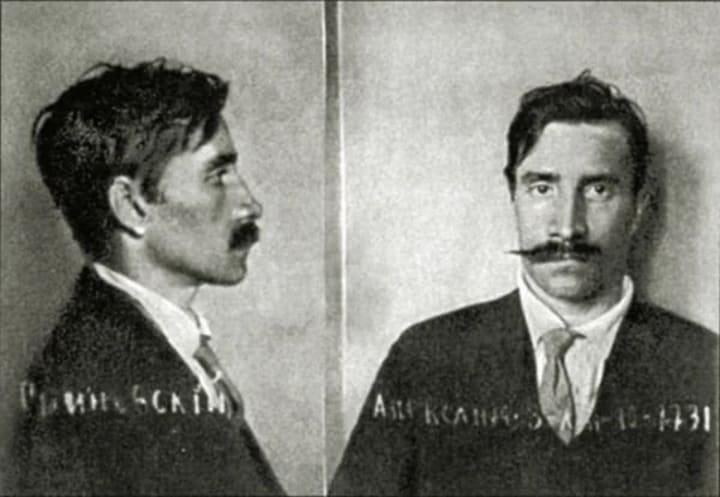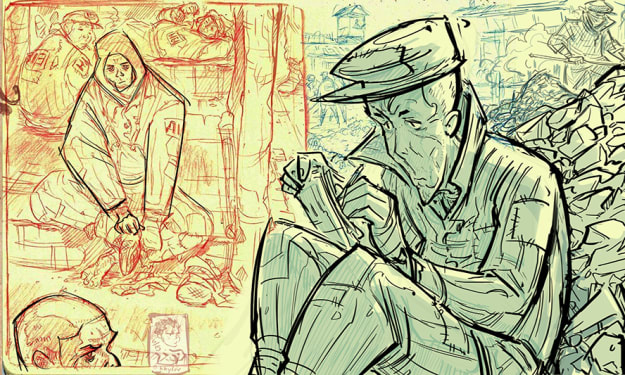Scarlet Sails
Alexander Grin's beautiful idealistic world

As a pre-teen, I loved the Scarlet Sails novella by Alexander Grin (full last name Grinevich), the most under-appreciated Neo-romantic Russian writer who lived a hard life and died a tragic death.
Hated by the imperialist Russian regime because of his involvement in the Socialist Revolutionary Party that was striving to reform the monarchy into a parliamentary republic, Grin was prosecuted by the tsar police and spent many a month in jail. The mugshot below was taken in 1910, when at the age of 30 Grin was exiled to Arkhangelsk for propaganda of socialist revolutionary ideas among workers and sailors and for attempted escapes from jail.

When the Russian Revolution happened in 1917, Grin had a brief period when he was published, widely read and recognized, mostly by inertia from previous years: despite ideological differences, the tsarist regime did not prevent Grin's works from publishing. But Grin soon became disillusioned with the new revolutionaries because of the Red Terror and violence that resulted into Civil War. "I just don't understand how violence can be finished with violence," he used to say often. In 1919, when he was drafted into the Red Army, Grin got sick with typhus and spent over a month in the field hospital. He was discharged for health reasons and with the help of other fellow writers received housing, a tiny room in the "House of Arts" where other impoverished writers, poets and artists lived.
Grin retreated into his own world of living in that tiny room alone, going hungry for days, hardly interacting with anyone and writing. It was this period when he finished the Scarlet Sails, the novella for which he is most famous and recognized.
It is indeed an idealistic story of a boy and a girl, who had been ostracized and punished for their daring and foolish dreams, finally finding each other and falling in love, with the boy making the girl's dream come true.
"It was hard to imagine that such a bright flower, warmed by love for people, could be born here, in the gloomy, cold, and half-starved Petrograd, [now St.Petersburg] in the winter twilight of the harsh year of 1920; and that it was grown by a man who was outwardly sullen, unwelcoming, and as if closed off in a special world, into which he did not want to let anyone," recalled Grin's neighbor and fellow poet Vsevolod Rozhdestvensky. It would take three years for the Scarlet Sails to be published, as Russia was torn by the Civil War.
The Soviet ideologues who influenced what got published didn't like the writer either, as the over-romanticized and mystic world he created for his stories and novels did not fit the new Socialist realist ideology. They first stopped publishing his works and then banned them altogether.
After Grin's novel "She Who Runs the Waves" was published in a private literary journal, the newspaper 'Izvestia' (November 2, 1928), warned in its editorial: "In our revolutionary era, the era of struggle... for a scientific Marxist worldview, we must be especially merciless to all mystic-idealist tendencies that threaten to penetrate our literature. The mistake leads Grin into an ideological impasse." The newspaper demanded that the writer "must completely renounce his idealist philosophy."
In the trade magazine "Book and Unions," the prominent literary critic Georgy Blok commented on the same novel: "Grin’s work is alien to our modernity. In its moods and themes, the book is both incomprehensible and foreign to the working-class reader. The world of other people and other relationships, created by Grin’s imagination, is unnecessary for the Soviet reader in its abstraction. We do not recommend this book to the working-class reader."
Ostracized and pushed out of the literary circles, Grin and his devoted third wife Nina Mironova moved to Crimea in the hope that the clean sea air would be good for Grin's health. He continued to write, but as no publisher dared to take up his stories and novels, the couple lived in poverty. Grin died of stomach cancer in 1932, and his works did not see the light of day until the 1970s when a group of enthusiast writers published a collection of his works that was carefully preserved by his widow Mironova.
I've read most of Grin's works when I was young, and he is definitely one of my favorite writers. I hope that this story will interest you in his works as well. Below, I link a book of Grin's short stories if you'd like to get a taste of his writing.
You can also watch the 1970 Soviet film Scarlet Sails with decent English subtitles. Grin's widow didn't like the movie and thought that both lead actors were too shallow and stiff, but it is the classic that has never been remade and it faithfully followed Grin's novella.
About the Creator
Lana V Lynx
Avid reader and occasional writer of satire and short fiction. For my own sanity and security, I write under a pen name. My books: Moscow Calling - 2017 and President & Psychiatrist
Reader insights
Nice work
Very well written. Keep up the good work!
Top insight
Excellent storytelling
Original narrative & well developed characters






Comments (4)
Great story nice I like it
Gosh his life story is so sad. My heart goes out to him. His life also kinda, in some way reminded me of the artist Louis Wain.
Really interesting article, Lana. I always enjoy learning about any author I hadn't heard of previously, the further back in history the better. And the Scarlet Sails image is something Monet would've been proud of.
Very interesting. I've honestly never heard of him. Thanks for sharing.